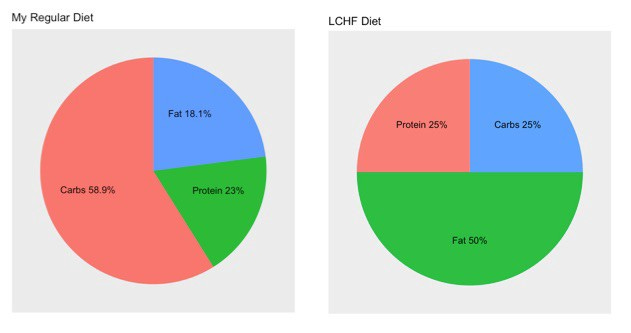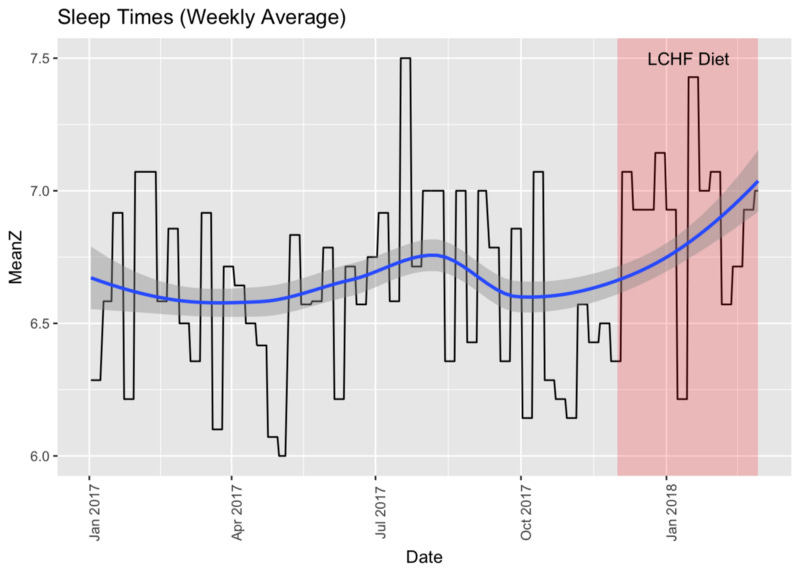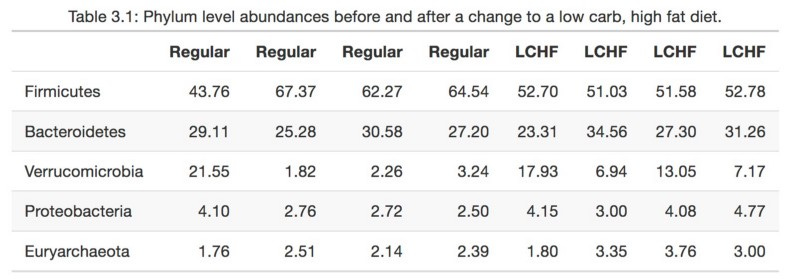Sleeping better on a different diet
Less carbs, more fat changed my microbiome and now I’m sleeping 25 minutes more/night.
Less carbs, more fat changed my microbiome and now I’m sleeping 25 minutes more/night.
After a lifetime of enjoying a banana or two almost every day, a microbiome test from DayTwo suggested that I quit eating them. It also recommends I stop eating most grains, and if I do, to eat them with fat. Generally the advice pointed toward more fat and fewer carbs, so for three months (Dec — Feb) I switched my diet to more of a low carbohydrate high fat (LCHF), with a goal of getting to under 25% carbs and 50% fat.

This was harder than I expected. I think of myself as a typical omnivore on a reasonably-healthy American diet: no sugary drinks or fast food, plenty of vegetables, mostly home-cooked meals with minimal processing. Sure, I make exceptions now and then, but my generally good health and weight level mean I don’t worry too much about what I eat.
I thought skipping bread and rice would be enough, but I learned that carbs are everywhere. To get under 25%, I’m allowed only 65g/day. Just my morning latte is 15g. A single banana is 23g, and if you add one more apple (22g), I’m over my daily limit. You can easily add fat: a tablespoon of olive oil (13g) or a tablespoon of butter (11g) won’t seem like much food, but it adds up quickly. The problem, I found, is that fatty foods also tend to fill me up, so I eat less. And as a percentage of my calories, that means I’m allowed even fewer carbohydrates.
But I persevered. I’m not going to claim I was perfect — I’m doing this experiment for fun, not for serious scientific research — so there were days when I indulged differently. Still, just making a conscious effort was enough to push my eating habits in the general direction of less carbs, more fat. And soon I began to notice some effects.
Three months into the new diet, daily tracking showed my sleep had changed slightly: I seemed to be sleeping longer and feeling better, an average of 25 minutes extra per night — a 5% improvement.

My sleep duration apparently increased by about 5% after switching to the new diet.
Could this have a microbiome explanation? To find out, I compared four gut microbiome samples taken after starting the new diet with four taken before.

Note the substantial difference in the levels of Firmicutes. The gut microbiomes of nearly all Americans are dominated by this group of bacteria, which is known to play a role in how the body absorbs energy from food. In fact, it was once thought that obesity might be linked to large amounts of this microbe, though that’s been disproven. All of my LCHF samples seem to have Firmicutes just slightly over 50%, whereas three of the four Regular samples are much higher. Is that a coincidence? Is it statistically significant?
To find out, I looked at all my gut samples from the previous six months, when I was on my “regular” diet, a total of 72 samples. The average (mean) abundance of Firmicutes in those samples is 60.14 (Regular diet) and 52.02 (LCHF). I also computed a simple T-Test:
Welch Two Sample t-testt = 6.2828, df = 65.746, p-value = 0.00000003024alternative hypothesis: true difference in means is not equal to 095 percent confidence interval: 5.5% <-> 10.7%Low p-values generally mean more significance, and in this case the extremely low number implies that the difference in sleep is unlikely due to chance alone. P-values have serious problems as a way to measure whether something is statistically significant, but as a sniff-test, the value in this case is so low that it’s worth investigating further. It would be hard to explain away the new, lower Firmicutes abundance as a coincidence.
Incidentally, among my large number of Regular samples there were a few with under 50% Firmicutes abundance, but were easily explained: for example, three of them happened after my Soylent experiment.
But what might this have to do with sleep?
Well first of all, the gut contains 400 times more melatonin than the pineal gland. In fact, 80% of the precursors to the sleep- and mood-regulating neurotransmitter serotonin are made by gut bacteria. Any dietary change will affect microbes, so it’s not surprising that I hit upon some that might feed the ones that affect sleep.
Many studies point to the role of Bifidobacterium, an important ingredient in many commercial probiotics, as a generator of many of the compounds that associated with sleep. I’ve experimented with this myself, with mixed results. I didn’t see any major shifts in Bifido this time, despite the better sleep, but maybe it’s not the Bifido itself, but some complicated relationship among multiple microbes. That’ll be the point of my next analysis.
Conclusion: A low-carb high fat diet can affect Firmicutes abundance, and in my case it affects sleep as well. If I can figure out what’s driving this, maybe I can improve my sleep even more — or perhaps offer microbiome-informed suggestions for how you can improve too.
Originally published at richardsprague.com on March 6, 2018.


